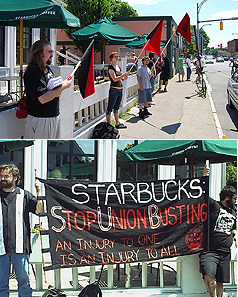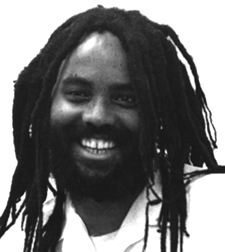Rochester Wobblies Picket against Starbucks’ Union Busting on Global Day of Action
 On July 5, the Rochester branch of the Industrial Workers of the World (IWW) participated in an international day of solidarity against the union busting practices of Starbucks Coffee Company. Approximate 15 members of the union local showed up to distribute flyers, talk to customers, pedestrians, and workers, waved union flags, sang, danced to music, and picketed in the spirit of worker solidarity. Members handed out nearly 200 pieces of information to interested parties.
On July 5, the Rochester branch of the Industrial Workers of the World (IWW) participated in an international day of solidarity against the union busting practices of Starbucks Coffee Company. Approximate 15 members of the union local showed up to distribute flyers, talk to customers, pedestrians, and workers, waved union flags, sang, danced to music, and picketed in the spirit of worker solidarity. Members handed out nearly 200 pieces of information to interested parties.
The global day of action was announced by the Confederacion Nacional de Trabajadores (CNT-AIT) in Sevilla, Spain and the Grand Rapids, Michigan Starbucks Workers Union (IWW) in response to two recent anti-union terminations. Starbucks has exhibited a pattern of firing outspoken, union baristas ever since the advent of the Starbucks Workers Union in 2004, and evidently, is initiating the same strategy against the CNT in Spain. Click the "more" button to read the whole article.
Photos: 1 | 2 | 3 | 4 | 5 | 6 | 7 | 8 | 9 | 10 | 11 | 12 | 13 | 14 | 15 | 16
Radio Interview: Uprising Radio (KPFK Pacifica) Los Angeles interview about Day of Action
Video: 6.5.08 Global Action Day against Starbucks Monroe Ave Roc NY
Additional Information: IWW Starbucks Workers Union | Grand Rapids Starbucks Union (IWW) | Sección Sindical en Starbucks (CNT-AIT) | Industrial Workers of the World | Starbucks Union Statement on Closure of 600 Stores
Indy TV #7 Human Trafficking in the Context of Immigrant Rights
#media_2279;left# In the early days of Capitalism, slaves were a large part of the agricultural work force in the United States. We're often led to believe, in our history courses, that slavery is an aberration contained in the past. However, slavery has continued to exist right up through US History and into the present day. Of course we now have different names and arrangements for slavery. Sweat Shops, Prison Labor, and Human Trafficking are some of these new arrangements.
Thompson explains the specifics of Trafficking: "As it tends to be used in today's context, Human Trafficking is a synonym for Modern Day Slavery and there's a lot of truth in that. But to get more specific, to get into the legal definition of what trafficking is: Human Trafficking is about using force, fraud or coercion, for example threats of force, to make someone perform labor for you. So they can get paid for it, and in that sense its important to distinguish: is it slavery or is it not slavery has become a lot more complicated in modern times."

Is Riding the Bus a Ticket to Jail?
 U.S. Customs and Border Protection, also known as the Border Patrol, confirms that its agents in Syracuse, Rochester and Buffalo check the citizenship status of travelers passing through by bus and train every day.
U.S. Customs and Border Protection, also known as the Border Patrol, confirms that its agents in Syracuse, Rochester and Buffalo check the citizenship status of travelers passing through by bus and train every day.
Agents check for citizenship in the bus and train station—often waiting at the Greyhound ticket counter, or watching people as they disembark for food—and onboard buses and trains already filled with passengers. People who have witnessed or been subject to Border Patrol agents questioning describe two practices: agents explicitly target a group of people or ask everyone on board about their citizenship status.
People routinely singled out for questioning include those who appear to be Mexican, Central American, South Asian, Asian, Afro-Caribbean, or Middle Eastern, according to reports from the Detainment Task Force, a Northern New York group. Border Patrol officials deny that the agency racially profiles, insisting that they look for suspicious behaviors and, “question people with blond hair and blue eyes as much as anyone else.†But common understandings of race in the U.S. fuse nationality and ethnicity so that some groups are permanently deemed to be “foreign.†Read the full article by clicking the "more" button below.
Additional Information: Detention Task Force | American Harvest: a naïve, incomplete, and shamefully ignorant portrait of agriculture in the United States | Chilean Activist Victor Toro Detained By Homeland Security | Victor Toro Released on Bail | ColorLines.com
Rochester's Anti-Racist Movement Visits WHAM

The Rochester Anti-Racist Movement (ARM) went to the offices of WHAM radio today to talk with the station management about Bob Lonsberry's recent racist, sexist and classist remarks. After the meeting ARM gave a press conference, calling for him to be removed from the air.
Below is a summary of ARM's position:The recent (June 10, 2008) comments made by Bob Lonsberry on WHAM 1180 were an unacceptable continuation of Mr. Lonsberry’s history of on- air racism, sexism and classism. For far too long Mr. Lonsberry has been permitted to cross the boundaries of decent discourse. It is apparent that he feels entirely comfortable, to say nothing of completely justified, in making hateful, hurtful, and erroneous statements about people of color, women, and people who are poor. His expressed views both tap and reinforce an undercurrent of hostility, which serves to perpetuate the social divisions of our community and calls to question our community’s resolve to eradicate those divisions.
Therefore, it is with a high degree of resolve that ARM calls for the removal of Bob Lonsberry from the public airwaves. The offensive content of Mr. Lonsberry’s remarks will not be allowed to hang, unchallenged, in our communal air. No individual should have the sense of entitlement that permits them to continually pollute that communal air.
Specifically, we are outraged that Mr. Lonsberry believes he can, with impunity:
- Disrespect young women who have overcome obstacles by stereotyping them as immoral, while choosing to ignore the varied circumstances, both social and individual, that created those obstacles in the first place.
- Demean these young women by the use of blatantly sexist language.
- Disparage the hard work of African American students by arbitrarily de-valuing the considerable achievement of attaining a grade B average.
Indy TV #6 Steve Kurtz of the Critical Art Ensemble
#media_2264;left# Steve Kurtz , member of the Critical Art Ensemble and SUNY at Buffalo Visual Arts professor, joins us this week as we discuss the surreal events of these past four years of his life. On May 11, 2004, Steve Kurtz called 911 from his Buffalo, NY home when he found that his wife had died in her sleep. While attending to the call the police became suspicious and called the FBI after they saw parts of Steve's art project that included standard laboratory equipment. The case exemplifies both the bizarre and dangerous effects of the Bush War on Terrorism, and how the FBI and new laws such as the Patriot Act have been used to target academic and artistic work that is critical of the corporate state.

New York State Assembly Passes Medical Marijuana Bill; Needs Senate Approval
 ALBANY, NEW YORK - On June 18, the New York State Assembly passed a bill (A.4867-B) that would protect New Yorkers with life threatening or debilitating conditions from arrest for using medical marijuana when their doctors believe it would be the best treatment option, 79-48. The bill is similar to the medical marijuana bill the Assembly passed last year. The version passed today was modified to address concerns voiced by members of the Senate, who have until June 23 to pass the bill before the legislature recesses.
ALBANY, NEW YORK - On June 18, the New York State Assembly passed a bill (A.4867-B) that would protect New Yorkers with life threatening or debilitating conditions from arrest for using medical marijuana when their doctors believe it would be the best treatment option, 79-48. The bill is similar to the medical marijuana bill the Assembly passed last year. The version passed today was modified to address concerns voiced by members of the Senate, who have until June 23 to pass the bill before the legislature recesses.
Ask your state senator to call for a prompt vote on medical marijuana: Take Action
More Information: Marijuana Policy Project
Indy TV #5: A Conversation with Disability Rights Activists
#media_2257;left# This week's Indy TV is a conversation with two Disability Rights activists; Anita Cameron, a systems advocate from the Center for Disability Rights and Mustafa Hayes, a self advocate who has received services through CDR. Both are members of the Rochester Chapter of ADAPT. CDR is part of a national network of independent living centers that has been operating in Rochester for the past decade. ADAPT is a national Grassroots Disability Rights group devoted to eliminating the institutional bias through direct action.
American Harvest: a naïve, incomplete, and shamefully ignorant portrait of agriculture in the United States
 I am writing to express my deep, deep disappointment with the film American Harvest, which opened in Rochester last Saturday at the Little Theater. I am a paralegal and outreach worker at Farmworker Legal Services of New York, a nonprofit law office based in Rochester. From my two years of providing legal services to farm workers in the Rochester area and beyond, I can say—from personal experience—that American Harvest presents a naïve, incomplete, and shamefully ignorant portrait of agriculture in the United States.
I am writing to express my deep, deep disappointment with the film American Harvest, which opened in Rochester last Saturday at the Little Theater. I am a paralegal and outreach worker at Farmworker Legal Services of New York, a nonprofit law office based in Rochester. From my two years of providing legal services to farm workers in the Rochester area and beyond, I can say—from personal experience—that American Harvest presents a naïve, incomplete, and shamefully ignorant portrait of agriculture in the United States.
The film’s director, Angelo Mancuso, appears to have begun this project with honorable intentions, and I’m sure he feels his film is supportive of the mostly immigrant workers who plant and harvest America’s crops. But, as revealed in scene after scene of his movie, Mr. Mancuso fundamentally fails to understand the nature of our agricultural system and the brutal conditions suffered by its labor force. Essential facts are omitted, crucial context is lacking, and rosy clichés about farm workers’ satisfaction with their lot in life go unquestioned.
To be absolutely clear, I don’t disagree with the central premises of American Harvest: that immigrant farm workers are essential to the contemporary agricultural system, that the current immigration policy is unjust and makes no sense economically, and that America’s politicians need to take far more decisive and pragmatic actions to fix this broken situation.
The problem lies in the fact that Mr. Mancuso has made a 95-minute movie—purportedly dedicated to explaining how the “American Harvest†gets harvested—that contains not one word regarding the abuses of workers’ rights and human rights that are the norm, not the exception, in this line of work. How is this possible? How does a self-proclaimed journalist miss such a crucial part of the story? For instance, about 20 minutes of Mr. Mancuso’s film take place in Immokalee, Florida. With a simple Google search [of Immokalee Florida and immigrants], the director would have learned that the Immokalee area has had half a dozen agricultural slavery cases—not just slavery-like conditions, but actual slavery, according to the federal government—exposed in the last ten years. Many workers in Immokalee continue to live twelve to a single trailer, while paying rent prices that rival Manhattan’s. Mainstream regional newspapers like the St. Petersburg Times and the Naples Daily News have reported these conditions thoroughly, as have magazines such as National Geographic and The New Yorker. Abuse is hardly an obscure aspect of farm work in Florida. Read the rest of the letter by clicking the more button below.
Other Critical Local Reviews: American Harvest: a superficial, patronizing, and smug film
Additional Information: Farmworker Legal Services of New York | Immigrant Solidarity Network | Coalition of Immokalee Workers | Student / Farmworker Alliance | Alliance for Fair Food | DeleteTheBorder.org
Indy TV #4: Interview with Filmmaker Mara Ahmed
#media_2233;left# On Sunday June 8th, at 1pm, Rochester area Filmmaker Mara Ahmed will premiere her film "The Muslims I know" at the Dryden Theater. Her film takes the form of a conversation between Pakistani-Americans in the Rochester area who come from her own subculture and vox pop interviews with random Rochesterians who are encouraged to ask candid questions about Islam, Middle Eastern Culture, and the realities of being a Muslim immigrant inside post- 911 united States.
Iran Travel Blog From Local Peace Delegate
Rochester resident and activist Judy Bello recenetly travelled to Iran with a Fellowship of Reconciliation Civilian Peace Delegation. While there and after she got back, she wrote an incredibly detailed and engaging report of her experiences there. The photos are beautiful as well…

I wake in the morning with a pounding headache and very sore nose. I am tired and not ready to travel the morning after the bus accident. Our hotel is lovely. Roses are blooming in the courtyard as I cross on the way to the lobby. Why should I want to leave? Maybe the new bus will be delayed. I am hoping for a respite, but the bus is here and it is time to check out. Before leaving town, there are a few more places to visit.
We are going to see the Old Town of Yazd, a very old city still inhabited and maintained as it was 600 years ago. Our starting point is the ancient Jaame Kabir Mosque built by Seyed Rukn al-Din for his tomb.
A Jaame Mosque is the central Mosque in a city or Town and this Mosque was built during the Seljuk Dynasty, and is a renowned example of the architecture of that period. The Mosque is located in the middle of the Old Town of Yazd, and we enter through the Bazaar. Outside the gate there are small shops with their wares displayed in front. I am cheered by a shop full of beautiful tapestries, the Excedrin is kicking in, and things are looking up. I make a note to stop on the way out.
(Click the "More" link for the rest of this post and links to the entire series)
